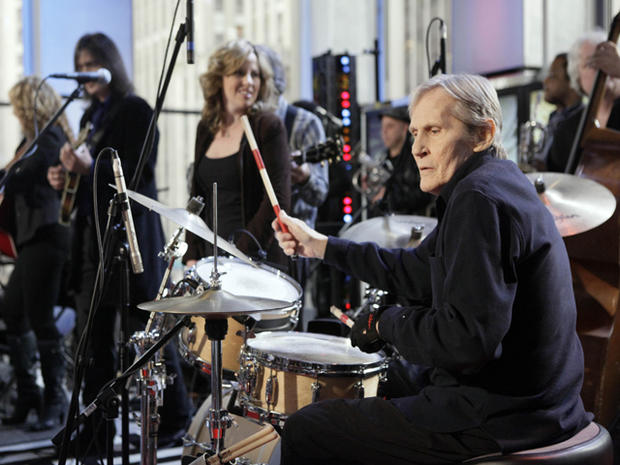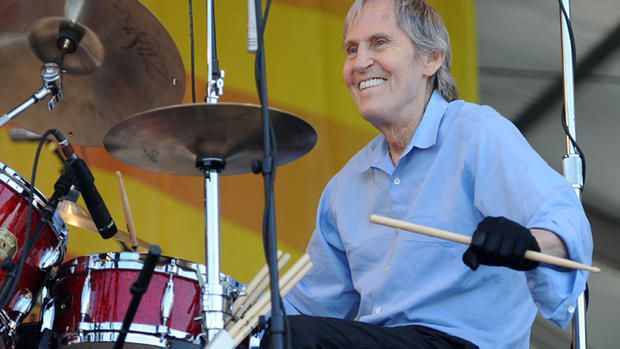Levon Helm of The Band dies at 71
(CBS/AP) Musician Levon Helm, founding member of The Band, died on Thursday in New York. He was 71.
A note on Helm's website explained, "Levon Helm passed peacefully this afternoon. He was surrounded by family, friends and band mates and will be remembered by all he touched as a brilliant musician and a beautiful soul."
Pictures: Levon HelmRead more: Levon Helm in the final stages of cancer
Read more: Levon Helm being read online dedications
Read more: Robbie Robertson visits Levon Helm
Watch: Eye to Eye with Levon Helm
Helm, who was found to have throat cancer in 1998, died of complications from cancer at Memorial Sloan-Kettering Cancer Center in New York City, said Lucy Sabini of Vanguard Records.
"He passed away peacefully at 1:30 this afternoon surrounded by his friends and bandmates," Helm's guitarist Larry Campbell told Rolling Stone. "All his friends were there, and it seemed like Levon was waiting for them. Ten minutes after they left, we sat there and he just faded away. He did it with dignity. It was even two days ago they thought it would happen within hours, but he held on. It seems like he was Levon up to the end, doing it the way he wanted to do it. He loved us, we loved him."
Earlier this week, Helm's family announced that he was in the final stages of his cancer battle.
The singer-drummer was diagnosed with throat cancer in the '90s, but that didn't stop him from performing and recording albums.
His 2007 solo album, "Dirt Farmer," and 2009's "Electric Dirt" both won Grammys.
In recent years, Helm led a regular series of intimate jam sessions called "The Midnight Ramble" at his home in Woodstock, N.Y. He often had guests and family members join him on stage for the shows, which would go into the wee hours of the morning.
He frequently toured with The Levon Helm Band, but was recently forced by ill health to cancel some shows, including an appearance at the New Orleans Jazz and Heritage Festival later this month.
The Band released its first album, "Music From Big Pink," in 1968 and eventually went on to produce seven releases, including a live recording in 1972. Helm's voice could be heard on such classics as "The Weight," "Up on Cripple Creek" and "The Night They Drove Old Dixie Down."
Helm and his band mates - Canadians Rick Danko, Garth Hudson, Robbie Robertson and Richard Manuel - were musical virtuosos who returned to the roots of American music in the late 1960s as other rockers veered into psychedelia, heavy metal and jams.
Early on, The Band backed Dylan on his sensational and controversial electric tours of 1965-66 and collaborated with him on the legendary "Basement Tapes," which produced "I Shall Be Released," "Tears of Rage" and many other favorites.
The son of an Arkansas cotton farmer, Helm was just out of high school when he joined rocker Ronnie Hawkins for a tour of Canada in 1957 as the drummer for the Hawks. That band eventually recruited a group of Canadian musicians who, along with Helm, spent grueling years touring rough bars in Canada and the South.
They would split from Hawkins, hook up with Dylan and eventually call themselves The Band - because, as they explained many times, that's what everyone called them anyway.
In some ways, The Band was the closest this country ever came to the camaraderie and achievement of the Beatles. Each of the five members brought special talents that through years of touring, recording and living together blended into a unique sound.
The tall, lanky Robertson was an expert blues-rock guitarist and the group's best lyricist, his songs inspired in part by Dylan and by the stories Helm would tell him of the South. The baby-faced Danko was a fluid bassist, an accomplished singer and occasional writer. The bearish Hudson was a virtuoso and eccentric who could seemingly master any instrument, especially keyboards, while the sad-eyed Manuel's haunting falsetto on "Whispering Pines," "Tears of Rage" and others led Helm to call him the group's lead singer.
But for many Band admirers, that honor belonged to the short, feisty Helm, whose authoritative twang once was likened to a town crier calling a meeting to order. He not only sang "Dixie Down," he inhabited it, becoming the Confederate Virgil Caine, "hungry, just barely alive," his brother killed by the Yankees, the South itself in ruins. It was the kind of heartbreaking, complicated story and performance that had even Northerners rooting for the proud and desperate Virgil.
"The Weight" and many other songs were true collaborations: Helm's voice was at the bottom, Danko's in the middle and Manuel on top. Helm - the group's musical leader on stage - played drums loose-limbed and funky, shoulders hunched and head to the side when he sang.
But the group, especially Manuel, struggled with drugs and alcohol. While Danko and Manuel shared songwriting credits in the early years, Robertson was essentially the lone writer for the last few albums. By the middle of the decade, Robertson, especially, was burned out and wanted to get off the road.
They bid farewell to live shows with a bang with the famous "Last Waltz" concert in 1976, which was filmed by director Martin Scorsese. The concert featured a range of musical heavyweights, including Muddy Waters, Ringo Starr, Bob Dylan and Eric Clapton. "The Last Waltz" is regarded by many as the greatest of concert films, but it also helped lead to a bitter split between Robertson and Helm, once the best of friends.
Robertson became close to Scorsese during the production, and Helm believed the movie was structured to make Robertson the leader and advance his own movie career. They rarely spoke after, despite efforts by Hawkins and others to intervene.
While Helm would accuse Robertson of being on a star trip, Helm, ironically, was the more successful actor, with acclaimed roles in "Coal Miner's Daughter," "The Right Stuff" and other films. And no one who watched "The Last Waltz" could forget Helm's performance of "Dixie Down," shot mostly in closeup, his face squeezed with emotion.
In his memoir, "This Wheel's on Fire," Helm said some hard feelings about Robertson also included his getting songwriting credits on Band songs that other members considered group efforts. Robertson would deny the allegations. On his Facebook page this week, he revealed that he had been devastated to learn of Helm's illness and visited him in the hospital.
"I sat with Levon for a good while, and thought of the incredible and beautiful times we had together," Robertson wrote.
Without Robertson, The Band reunited in the 1980s but never approached its early success. Manuel hanged himself in a Winter Park, Fla., hotel room in 1986. Danko died in his home near Woodstock in 1999, a day after his 56th birthday.
Rolling Stone named Helm one of the 100 greatest singers of all time. Original members of The Band were inducted into the Rock and Roll Hall of Fame in 1994. In 2008, the Recording Academy honored him with a lifetime achievement award as an original member of The Band. That same year, Helm received the Americana Music Association's artist of the year honor.
Helm is survived by Sandra, his wife since 1981, and his musician daughter, Amy Helm, whom he had with songwriter Libby Titus. He's also survived by two grandchildren.

